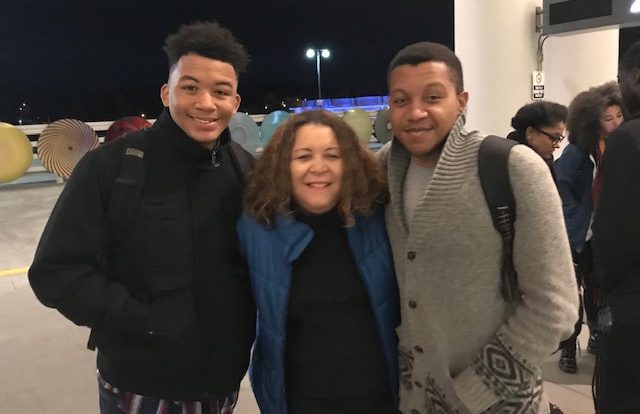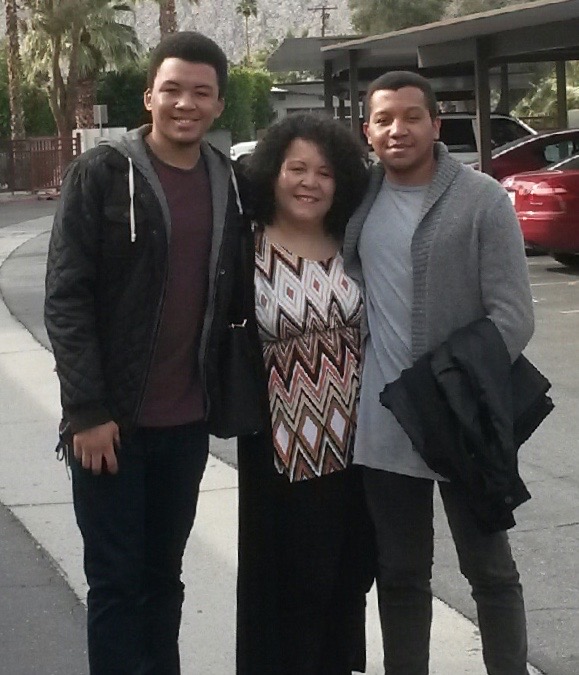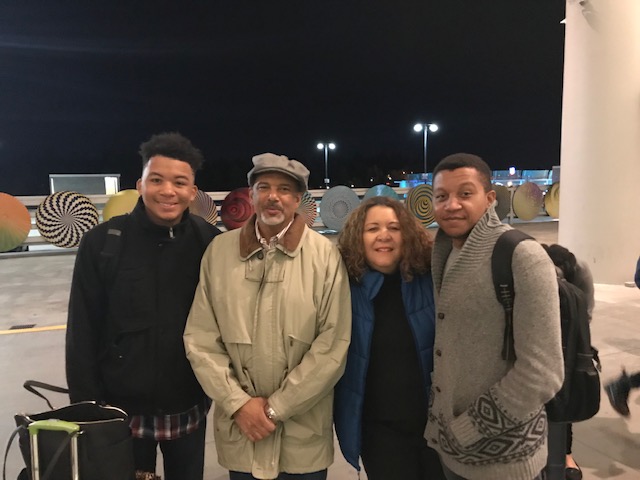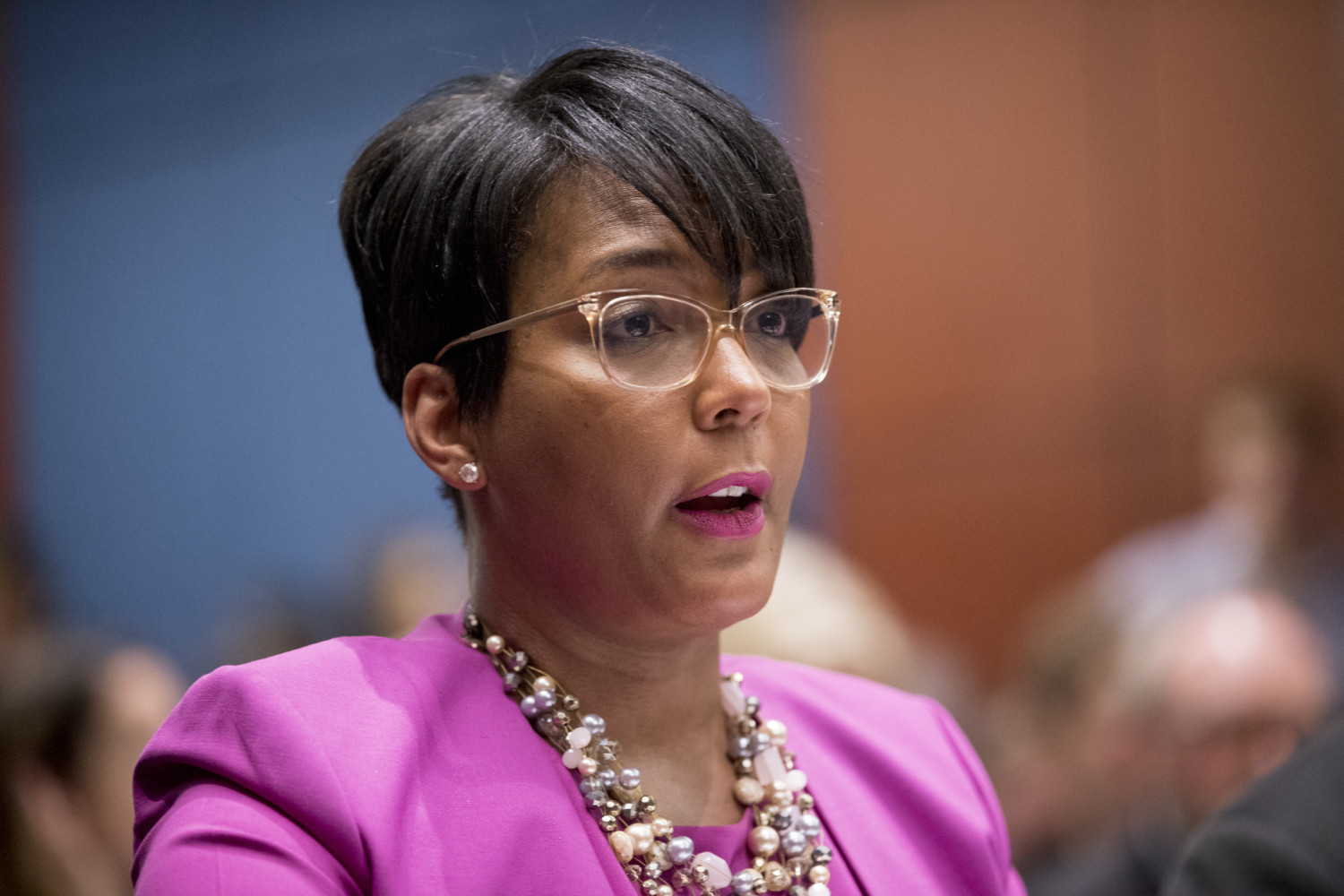I’m the mother of two black sons and George Floyd’s death is my worst nightmare

For eight minutes and 46 seconds, the world watched as George Floyd’s life evaporated under the weight of a Minneapolis police officer’s knee.
He pleaded for his life. His very breath. Sixteen times.
“I can’t breathe man. Please!”
But it was the word every mother remembers hearing her child say for the first time that became one of Floyd’s last.
“Mama.”
It seeped through my skin into my heart. My very soul. Even now, thinking about it brings goosebumps.
Some say as you die, loved ones who’ve passed on before you come to you to welcome you to the other side. Was that Floyd’s experience? Was that why he called out for his mother who had died two years ago? Did she hover nearby?
We will never know but I know this: As a black mother of two sons, Floyd’s death at the hands of a police officer is one of the many versions of hell that play out in my mind when I think of the potential racial landmines out there awaiting my own sons and other black men.
The day I gave birth to each of my sons, now ages 28 and 23, was the day I also gave birth to this incessant worry and fear that constantly hovers overhead — and sometimes crowds out — the joys of being a parent.
As thousands continue marching all over the world protesting Floyd’s death, I know they will all eventually go home. This fervor over America’s racial injustice will inevitably die down. Again. Like it did after Trayvon Martin, Tamir Rice, Malice Wayne Green, Abner Louima, Amadou Diallo, Eric Garner, Michael Brown, Freddie Gray, Philando Castile, Ahmaud Arbery, Breonna Taylor, Sandra Bland, and Rodney King and so many other victims whose names never made headlines.
But my worry, my fear, my anguish does not dissipate — not as long as I am a member of the MOBB (Mother of Black Boys). Not as long as I know that black men are two and half times more likely than white men to be killed by police. That difficult information hovers near my heart, creeps into my mind constantly.
My sons accuse me of being a helicopter parent — you know, the parent who hovers and smothers. But they don’t fully grasp the internal struggle I go through every time they walk out the door. Every time I call them on the phone and I don’t get an answer. Like other black mothers I know, I can’t go to sleep until my youngest returns home — no matter how late.
As I watch thousands of young protestors of all ethnicities flood the streets of Atlanta, Detroit, Los Angeles, Chicago, New York, Houston and other cities, I’m reminded of what the of the parents of the Parker High School students in Birmingham, Alabama, must have felt when they skipped school May 3, 1963, to protest the racial injustices only to be met with vicious dogs and firehoses.
Just as I inherited my light brown eyes and skin, I also inherited the experiential mantle every black mother wears. That mantle holds a laundry list of emotions.
It’s the heart-in-your throat angst my grandmother must have felt when my father, a 23-year-old newly minted second lieutenant, and an army buddy drove across the segregated south in the 1950s from Fort Hood, Texas, where he did basic training, to his rural Virginia home. They wore their uniforms hoping that would ward off any potential mayhem that may befall them. There were no hotel or restaurant stops.
It’s the below-the-surface anger my mom felt as she called the local police chief to ask him to stop the harassment of my then-high-school-age brother. One of the local cops constantly stopped him, made him get out of his car and walk a straight line to see if he was drunk or high. To this day, my brother, now 55 years old, doesn’t drink or do drugs. Or the hurt my mother and father must have felt when my brother and a group of black managers sued their employer due to lack of promotions and other discriminatory practices.
It is most likely the same mixture of helplessness and fear I felt when I learned cops pulled my son and his two friends over along a dark, desolated stretch of rural Georgia highway as they were headed back to his college after a weekend at home. A drug-sniffing dog circled the car. No drugs were found.
I’m tired of living in a society that declares its citizens have the right to “life, liberty and the pursuit of happiness” yet my children are limited by centuries-old race-based barriers. For most black children, “can’t” and “don’t” are constant admonitions. How does one press forward when there are few protections built into the American system to protect people of color? In Georgia, where I live, there are no hate crime laws.
Despite the mountainous challenges, I am heartened by motherhood.
My heart swells with pride knowing both sons are college graduates with no student loan debt. My oldest works for a tech company in Los Angeles. My youngest “graduated” last month without the cap and gown or traditional pomp and circumstance due to the coronavirus pandemic. I am encouraged by the potential of their futures.
I am inspired by mothers like Atlanta Mayor Keisha Lance Bottoms. During an impassioned plea to protestors to “go home,” Bottoms talked about how she told her 18-year-old son she wouldn’t be able to protect him once she imposed the citywide curfew. Her maternal empathy and leadership are guiding the city through tumultuous days.
I am inspired by the group of mothers in College Park, Georgia, who recently marched in protest against America’s unrelenting campaign against its black citizens. They may not have gotten global attention but they have my attention and they embolden me — just like the mothers of Atlanta’s Murdered and Missing Children in the early 1980s.
My maternal anguish isn’t reserved for black mothers.
I also am inspired by the Asociación Madres de Plaza de Mayo or Mothers of the Plaza de Mayo. I learned about this 43-year-old movement of Argentine mothers during a fellowship visit to the country in 2003. They campaigned for their children who went missing during the military dictatorship. Despite threats to their lives, the mothers repeatedly pressed for answers about their children from the government between 1977 and 2006.
So it is not surprising to me that George Floyd in his last eight minutes and 46 seconds on earth would call out for his mother. He knew instinctively his mother was hovering nearby even though she was no longer on this earthly plane.
It’s the same reason athletes mouth the words “Hi Mom” when on camera. That nine-month, in-the-womb bond is infinite and knows no limitations.
While society may try to dismiss my sons and other black men, no one (aside from God) knows them, fights for them, endures for them better than me.
I am their Mama.




